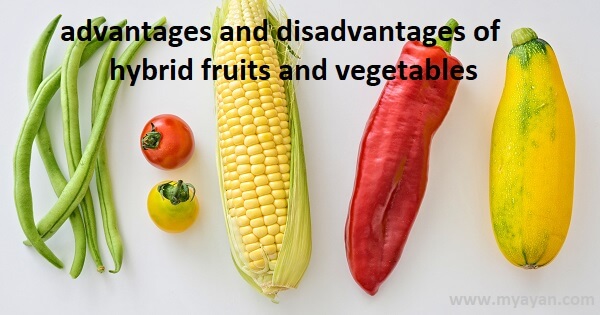There must be many hybrid foods right now in your kitchen and refrigerator right now. Vegetables and fruits are the most common among them. Take an avocado, tomatoes, potatoes, or even eggs. What hybrid refers to is the cross-breeding of anything, whether plants or animals. But this discussion is about hybrid fruits and vegetables. There have been many arguments about the use of hybrid plants and their production. Here are some Advantages and Disadvantages of Hybrid Fruits and Vegetables you should know.
Hybrid plants can grow naturally, but mostly, these are grown deliberately by farmers. Hybridization is obtained by cross-pollinating two or more varieties of the same fruit or vegetable. The pollen from one variety is used to fertilize a similar plant of another variety, and the result is a hybrid. For example, mango has many types with seeds weighing less and more pulp inside. Just for your knowledge, India is the major producer of Mangoes with more than 12 varieties.
Hybridization is done in Agriculture, Horticulture, Gardening, and animal farming. The purpose is one to obtain a better version full of nutrients. Even humans are also hybrid, where people with different blood types and genes combine to yield a separate offspring. But how good hybridization is? Is there any downside of hybridizing fruits, or there are benefits of hybrid plants only?
First Hybrid Vegetable: Corn plant was the first hybrid food produced and supplied to the market in the 1930’s.
Hybrid foods are considered in both positive and negative opinion-wise. Hybrid food does not occur naturally like plants and can't be obtained without human intervention. Let's dive into the details about the pros and cons of hybrid foods.
The process of hybridization is artificial but totally natural. There are no chemicals involved in the process of hybrid farming. Moreover, the practice is safer for farmers who have specialized in hybrid farming. Crop production is multiplied, which is also beneficial for the population.
The motive of producing hybrid fruits and vegetables is primarily to improve the quality and quantity of vital elements. This improvisation turns the food healthier and tastier. The varied fruits and vegetables are more colorful and full of minerals necessary for growth.
Crop producers don’t have to work through the year to cultivate hybrid food. Hybrid or crossbred crops are seasonal and are easy to grow while the rest of the process remains the same as that of the conventional production methods.
Although hybrid foods are a healthier and safer option, yet there are some reasons why many prefer staying with conventionally grown food. The most prominent and debatable disadvantages of hybrid fruits and vegetables one needs to consider are as follows.
Hybrid seeds are expensive for the farmer, and this situation eventually puts the retail value of the produce to the higher side. Crop producers have to pay hugely to grow the proportional amount of fruits and vegetables. The expenses incurred on the cultivation and maintenance till the stage of ripening can only be covered by selling the produce at a higher cost as compared to the conventional product.
No seeds mean you can’t be able to prepare for the next season if you are planning to cultivate the same crop. You still have to pay the next time for the quantity you want to produce. However, this is not so in the case of open-pollinated crops.
The commercially produced hybrid crop is not immune enough to withstand diseases, infestation, and other natural factors like fungus or infections. The corn that was hybridized for the first time in 1930 also died due to less capability to withstand harsh conditions and resist pests.

According to scientific study, hybrids foods contain a higher number of nutrients, due to a better utilization of soil and resources and root that enhance its quality and resistance. This also supports the fact that hybrid fruits and vegetables are not bad for your health.
A Cavendish banana is loaded with antioxidants, vitamin C, and Vita B6. Additionally, they have low-calorie and high-fiber. Among other things, the nutrients in red bananas may contribute to improved heart and digestive health when eaten as part of an overall healthy diet. A red Banana has higher amounts and has sweeter in taste.
Hybrid fruits are vegetables are entirely different from Genetically Modified Organisms. According to the NonGMO Project, GMOs are “plants or animals that have been genetically engineered with DNA from bacteria, viruses or other plants or animals.
A hybrid vegetable is obtained when plant breeders cross-pollinate two different varieties of vegetables. The aim is to produce an offspring, or hybrid, that has the best traits of each of the vegetables. Cross-pollination is a natural process that occurs within members of the same species.